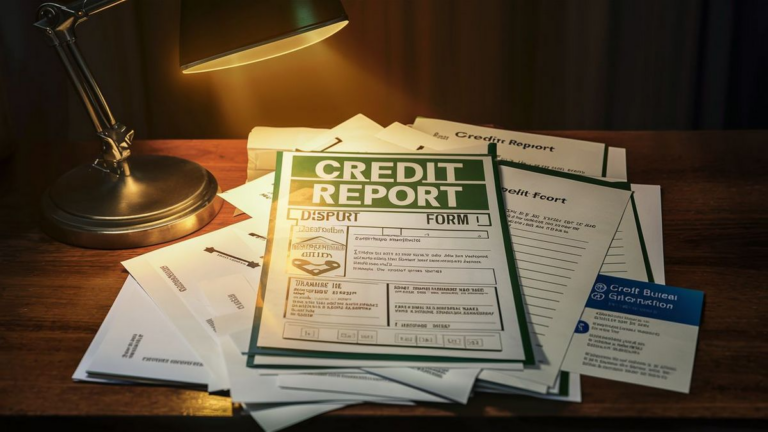Disputing errors on your credit report is crucial for maintaining a healthy financial profile. Inaccuracies in your credit report can negatively impact your credit score and affect your ability to obtain loans, mortgages, or even secure employment. Here, we provide a comprehensive guide on how to effectively dispute errors on your credit report.
Understanding Your Credit Report
Before initiating a dispute, it’s essential to obtain a copy of your credit report from each of the three major credit bureaus: Equifax, Experian, and TransUnion. You are entitled to one free copy of your credit report from each bureau annually through AnnualCreditReport.com. Review each report carefully to identify any discrepancies or inaccuracies.
Filing a Dispute
Once you’ve identified errors on your credit report, you can file a dispute with the respective credit bureau. Most credit bureaus offer online dispute resolution platforms, making the process convenient and efficient. Alternatively, you can submit your dispute via mail, including relevant documentation to support your claim.
Online Dispute Process
When disputing errors online, navigate to the website of the credit bureau where you identified the discrepancy. Follow the instructions provided to initiate the dispute process. You’ll typically be asked to select the item you wish to dispute and provide a brief explanation of the error.
Mail-In Dispute Process
If you prefer to file a dispute via mail, you’ll need to draft a letter detailing the inaccuracies on your credit report. Include your name, address, a copy of the credit report with the disputed items highlighted, and any supporting documentation such as receipts or correspondence with creditors.
Provide Supporting Evidence
Regardless of the dispute method you choose, it’s essential to provide supporting evidence to substantiate your claim. This may include copies of billing statements, payment receipts, or correspondence with creditors. The more documentation you provide, the stronger your case will be.
Follow-Up
After submitting your dispute, credit bureaus are required to investigate the matter within 30 days. During this time, they will review the information provided and communicate with the relevant creditors to verify the accuracy of the reported data. It’s advisable to monitor the status of your dispute regularly through the credit bureau’s online portal.
Review the Outcome
Once the investigation is complete, the credit bureau will notify you of the outcome. If the disputed item is found to be inaccurate, it will be corrected or removed from your credit report. In some cases, you may receive a revised copy of your credit report reflecting the updates.
Seek Legal Assistance
If your dispute is unsuccessful, or if you encounter difficulties during the process, you may consider seeking legal assistance. There are consumer protection laws in place, such as the Fair Credit Reporting Act (FCRA), which govern the accuracy of credit reporting and provide avenues for recourse in case of disputes.
Monitor Your Credit Regularly
Even after successfully disputing errors on your credit report, it’s essential to monitor your credit regularly to ensure the accuracy of the information. You can utilize free credit monitoring services or subscribe to a credit monitoring service for added peace of mind.
Disputing errors on your credit report is a fundamental right that enables you to maintain an accurate financial profile. By understanding the dispute process and providing supporting evidence, you can effectively rectify inaccuracies and safeguard your creditworthiness. Remember to monitor your credit regularly and seek legal assistance if needed.
Preventative Measures
Aside from disputing errors, there are proactive steps you can take to minimize inaccuracies in your credit report. Regularly review your financial statements, including credit card bills and bank statements, to detect any unauthorized transactions or discrepancies. Promptly report any suspicious activity to your financial institution and monitor your accounts for signs of identity theft.
Importance of Credit Monitoring
Credit monitoring services offer continuous surveillance of your credit report and alert you to any significant changes or suspicious activity. Subscribing to such services can provide early detection of errors or fraudulent activity, allowing you to take swift action to address issues before they escalate.
Benefits of Credit Monitoring Services
With credit monitoring services, you receive real-time alerts via email or mobile notifications whenever there are changes to your credit report, such as new accounts opened in your name or significant fluctuations in your credit score. This proactive approach empowers you to respond promptly to potential threats to your financial well-being.
Choosing the Right Credit Monitoring Service
When selecting a credit monitoring service, consider factors such as the scope of monitoring, frequency of alerts, and additional features such as identity theft insurance or credit score tracking. Compare different providers to determine which offers the most comprehensive protection tailored to your needs.
Understanding Credit Score Factors
In addition to monitoring your credit report for errors, it’s essential to understand the factors that contribute to your credit score. These may include payment history, credit utilization, length of credit history, types of credit accounts, and new credit inquiries. By focusing on improving these areas, you can enhance your overall creditworthiness.
| Credit Score Factor | Description |
|---|---|
| Payment History | Whether you make on-time payments consistently |
| Credit Utilization | The ratio of your credit card balances to credit limits |
| Length of Credit History | How long your credit accounts have been open |
| Types of Credit | The variety of credit accounts you have (e.g., credit cards, loans) |
| New Credit Inquiries | The number of recent applications for credit |
Frequently Asked Questions
- Is it possible to dispute errors on my credit report online?
- How long does it typically take to resolve a credit report dispute?
- Can I request a copy of my credit report more than once a year?
- What should I do if I suspect identity theft based on my credit report?
- Are there any fees associated with filing a dispute with credit bureaus?
See also:






